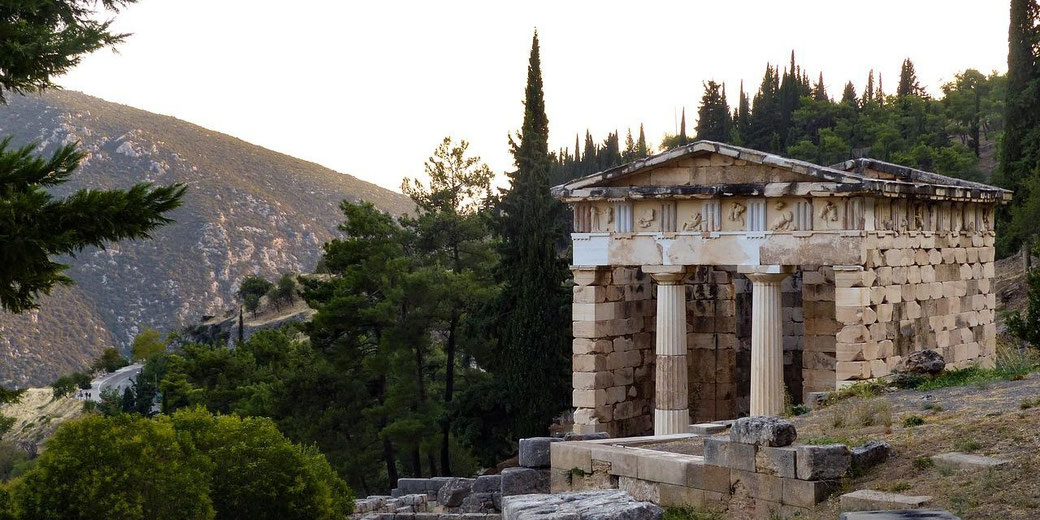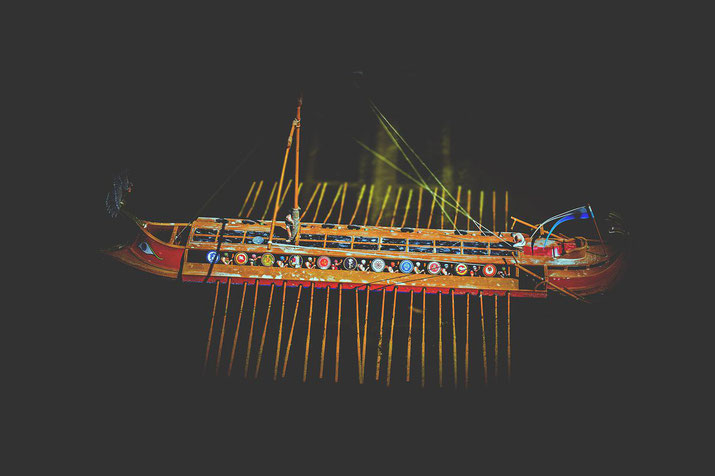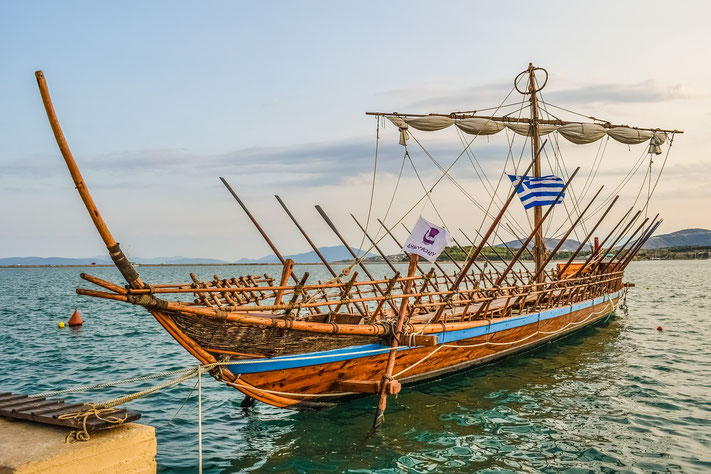How Xerxes I and Themistocles prepared for war

In 490 BC, the Persians were defeated by the Athenians at the Battle of Marathon. Ten years later, Xerxes I, son of Darius I, led a much larger Persian army in an attempt to conquer Greece.
This time, however, the Greeks were prepared. They managed to slow the Persian advance at the Battle of Thermopylae, buying enough time to prepare to defeat them at Salamis.
Death of Darius I
In October of 486 BC, king Darius I of Persia died suddenly from poor health. His death was a shock to the Persian empire, as he had been a strong and effective leader.
He was succeeded by his son Xerxes I, who was around thirty years old at the time.
Xerxes' first order of business was to deal with the rebellions that had sprung up in Egypt and Babylonia.
He quickly put down these rebellions and solidified his control over the Persian empire.
With this done, he turned his attention to Greece. Mardonius (who was his cousin and brother-in-law), pushed him to renew the campaign against Greece.
It appears that Mardonius' intentions were personal in that he intended to dominate the conquered country as a satrap following Xerxes' triumph.
Preparations for war
Xerxes began preparations for an invasion of Greece in 480 BC. He assembled a massive army .
The estimates of the size of Xerxes' army vary widely, with the figure of two million being provided by Herodotus.
Most modern scholars consider this to be an exaggeration, and the actual number was likely significantly lower, with estimates ranging from 100,000 to 300,000.
Xerxes also built a fleet of ships to transport his army across the Aegean Sea.
In order to finance his war effort, Xerxes imposed heavy taxes on his subjects. This caused unrest among the people and helped to rally support for the Greeks.
After four years of planning and preparations, he was finally ready to launch his attack.
Early career of Themistocles
Themistocles was one of the most important Greek leaders during this period. He was an Athenian general and politician who played a key role in defeating the Persians at Salamis.
Themistocles was not born into an aristocratic family, but a more middle-class one. Despite these origins, he was able to rise to dominance through the democratic political system in Athens.
In 493 BC, he became archon, establishing the port town of Piraeus and constructing its fortifications.
He made it the most important naval base in Greece. He also fought in the Battle of Marathon in 490 BC.
Realising Persia would try to invade again in the future, Themistocles believed that their best chance to defeat the invaders was to control the seas.
Also, in 483 BC, a new seam of silver had suddenly been discovered at the mines of Laureion, near Athens.
A great debate broke out in the Athenian Assembly over what to do with this new wealth. On one side of the debate was Aristides, who had the support of the traditional aristocracy.
He argued that the new wealth should be shared out equally among the people. Each one would receive around 10 drachmas.
However, Themistocles argued that the funds should be combined and be used to build a larger navy.
It seemed that Aristides' proposal would be adopted, but Themistocles was able to manipulate the people through an astute implementation of propaganda, to get the Athenians to ostracise Aristides in 482 BC.
With his political rival now gone, Themistocles' idea won the day and the money was used to build 200 new triremes.
Creation of the Hellenic League
In 481 and 480, Athens and Sparta held a series of congresses at the Isthmus of Corinth.
At them, they sought to find a consensus on the best strategy to defend Greece in the event of Xerxes' invasion. 31 Greek states agreed to form an alliance, which was called the Hellenic League.
Many Greek city-states in the north chose not to join the League as they feared they would suffer the most from a Persian attack which would march through their territories.
The League realised that many of these northern states would be tempted to ally themselves with Persia in the hopes of avoiding devastation.
In response, the Hellenic Leage agreed to fine any city that sided with Persian (known as ‘medising’).
Such fines involved the confiscation of the city's wealth and handing over a tenth of it to the shrine at Delphi.
Sparta was appointed to command of both the League's armies and navies. King Leonidas of Sparta was in charge of the land forces, while Eurybiades was in command of the ships.
Athens had sought command of the navy, as they provided most of the ships for to the League, but the other city-states preferred Sparta's command instead.
The Delphic Oracle's 'wooden walls'
In 481 BC, when the Greeks heard of Xerxes' immanent invasion of Greece, the Athenians sent messengers to the Oracle at Delphi to seek advice about how best to prepare.
In response to their request, the oracle gave them a prophesy that the 'wooden walls' of Greece would save them from Xerxes' invasion.
Themistocles interpreted this to mean that their navy was their best hope for victory, and he used this prophecy to rally support for his cause.
Themistocles proposed a strategy for the land forces where they specifically chose terrain for potential battles which would restrict the movement of large numbers of troops, such as mountain passes and narrow waterways.
He argued that this would be the best hope of nullifying the superior numbers of the Persian forces, both at sea and on land.
The League agreed with this proposal and adopted it for the upcoming campaign.
The League decided to send a force of around 10,000 hoplites north, to the Vale of Tempe in Thessaly, to take up a defensive position.
Xerxes' march to Greece
In 481 BC, Xerxes set out from Sardis with his army and fleet.
He crossed the Hellespont (now known as the Dardanelles) by building two temporary bridges across the ships of their fleet and continued his march through Thrace and Macedonia.
When his forces reached Mt. Athos, Xerxes ordered his soldiers to dig a 4-kilometre man-made canal through the land so that his fleets could avoid the stormy seas that threated them.
This delay gave the Greeks more time to prepare for his arrival and to scout out the strength of the Persian forces.
When King Leonidas realised the overwhelming numbers of Xerxes' army, he decided to retreat south so that they should block the narrow passage of the Thermopylae.
The Battle of Thermopylae
When Xerxes finally arrived at Thermopylae in 480 BC, he found the Greeks waiting for him.
The Greek army, led by King Leonidas of Sparta, was vastly outnumbered by the Persian forces.
Despite this, the Greeks held their ground for three days before they were betrayed by a local man named Ephialtes.
He showed Xerxes a secret path that led behind the Greek lines.
With this knowledge, Xerxes was able to flank the Greeks and attack them from behind. The Persians overwhelmed the Greeks and forced them to retreat.
Leonidas was killed in battle, but his sacrifice gave the other Greeks time to escape.
Following his victory at Thermopylae, Xerxes marched on Athens. The city was evacuated before Xerxes arrived, and the Persians burned the city to the ground.
Themistocles' victory at Salamis
Athens had been evacuated because Themistocles had persuaded the Athens to flee with their families to the nearby island of Salamis.
He argued that this would be the best way to protect them from Xerxes' army.
Themistocles then took his navy and set up a defensive position in the narrow straits between Salamis and Attica.
He knew that this would force Xerxes to fight him on terms that were unfavorable to the Persians.
When Xerxes arrived, he was hesitant to attack. He saw that the Greeks had taken a strong position and he did not want to risk his ships in the narrow waters.
However, his advisors convinced him to attack and so he ordered his forces forward. The Persian fleet was quickly defeated by the smaller Greek force.
This victory showed the Greeks that they could defeat Xerxes and so they continued to fight against him.
In the end, Xerxes was forced to retreat back to Persia. The Persian army were finally defeated at the Battle of Plataea in 479 BC, which ended the Persian invasion of Greece.
Themistocles' legacy
Themistocles is often credited with saving his from annihilation by the Persians. If he had not persuaded the Athenians to evacuate their city, it is likely that the Athenians would have surrendered.
His victory at Salamis was also crucial in hindering Xerxes' invasion. It showed the Greeks that they could win against the seemingly invincible Persian army.
Themistocles' legacy continues to this day. He is remembered as one of the great military commanders in history and his story is still studied by military strategists.
Further reading
What do you need help with?
Download ready-to-use digital learning resources
Copyright © History Skills 2014-2024.
Contact via email
With the exception of links to external sites, some historical sources and extracts from specific publications, all content on this website is copyrighted by History Skills. This content may not be copied, republished or redistributed without written permission from the website creator. Please use the Contact page to obtain relevant permission.







